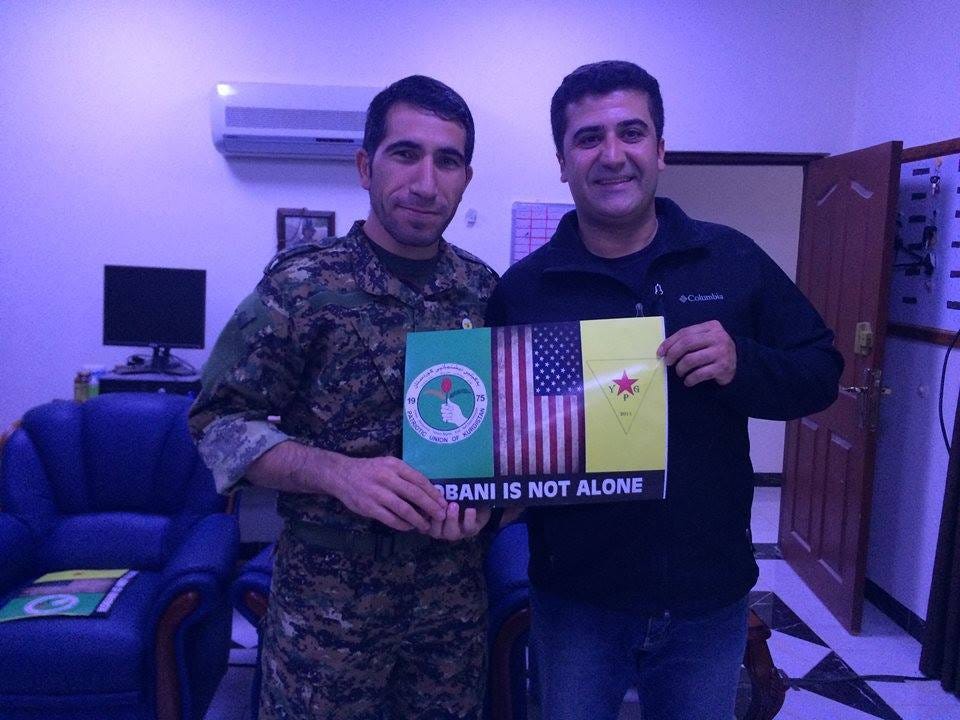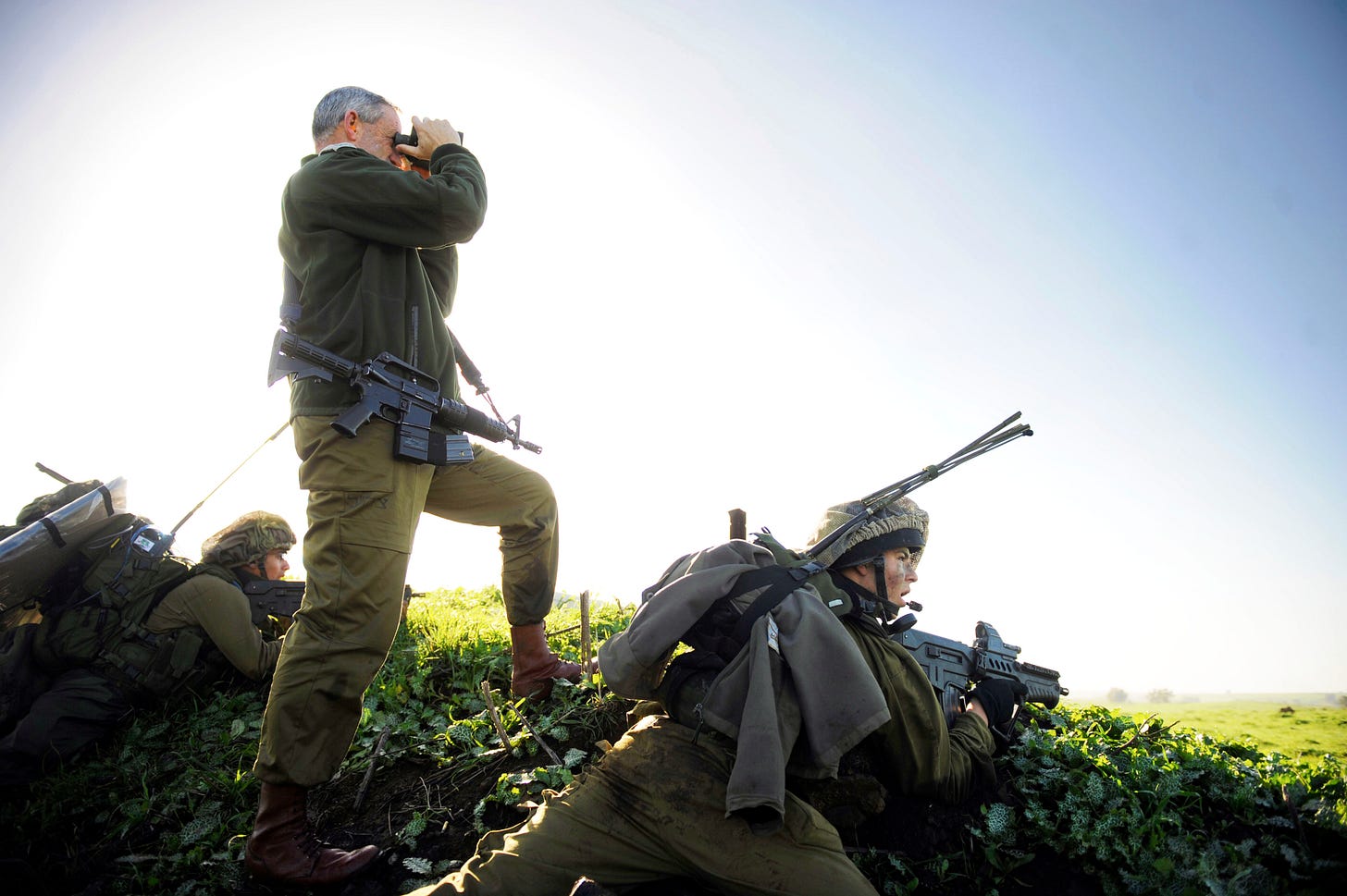The first "woman, life, freedom" guerrillas spent time in Israeli prison
The Iranian feminist slogan was coined by the PKK, a Kurdish party that cut its teeth fighting alongside Palestinian guerrillas in Lebanon.
I just published my second article for New Lines Magazine, about the Kurds who fought and died for the Palestinian cause in Lebanon. Please, please read the whole thing — it was one of the most underrated turning points in Middle Eastern history, one without which Turkey, Syria, Iran, and Iraq would look radically different today.
Here on Substack is the story behind the story, how I came to write about the topic.

Iranian crown prince Reza Pahlavi’s wife Yasmine is no stranger to online controversy. A few months ago, she posted on Instagram “death to the corrupt: clerics, leftists, and the [rival opposition group] Mojahedin-e Khalq.” Earlier this month, she again courted controversy on the app, posting the slogan “woman, life, freedom” along with a photo of an Israeli Border Police officer in Jerusalem.
There were a lot of layers of irony to that post. Probably the most burning one was that the motto “woman, life, freedom” was coined by supporters of a far-left Kurdish party. And that Kurdistan Workers’ Party (PKK) happened to get its start fighting against the Israeli army, alongside Palestinian guerrillas in Lebanon.
I happened to write my bachelor’s thesis on that aspect of the Lebanese civil war, the Middle Eastern foreign fighters. The stories of Europeans and Latin Americans who came to the Palestinian guerrilla camps from thousands of miles away are well-known. But non-Arab leftists from within the region — Iranians, Turks, Kurds, Armenians, et cetera — also volunteered as foreign fighters for the Palestinian cause.
That aspect of the PKK’s history is well-known to Kurds but little-discussed outside of Kurdish circles. And there’s one part of the story that no one has ever written about in English, apart from half a sentence in Hamdi Akkaya’s (excellent) paper on Kurdish-Palestinian relations. During the Battle of Beaufort Castle in June 1982, the Israeli army captured fifteen Kurds, who were taken to the Ansar prisoner-of-war camp in South Lebanon.
A couple years ago, I was sent a link to a remarkable document: the PKK party magazine from June 1984, buried in a now-defunct online archive, including drawings and poetry from inside the camp. (The person who sent the link would like to remain anonymous.) Then I found another edition of the party magazine, this one from 2017, explaining what eventually happened to the prisoners.
As I wrote in New Lines:
The June 1984 edition of Serxwebûn features drawings and poetry from the prisoners, including one Iranian Kurdish fighter. The Iranian Kurd, codenamed Sami, recalled being beaten by a Israeli interrogator who shouted: “You came to kill Jews, you’re lying…Kurdistan, Turkistan, Bangladeshi, Iran, Arab, you are all antisemitic, we will kill you all.”
The PKK were just one of many foreign fighter contingents in Lebanon. (Sami was captured alongside a Bangladeshi fighter, and another Serxwebûn article mentioned the presence of an Iranian from the left-wing Peoples Fedai Guerrillas.) At the time, the Palestinian movement was the international cause celebre, and leftists understood it to be part of an unbroken chain of Third World liberation struggles.
“If you know Vietnam, you know Kurdistan…a new Vietnam in our hearts,” Sami wrote in a poem. “To the defenseless prisoner in Diyarbakir, to the leaf on the tree in Vietnam, to the living being in Hiroshima and Nagasaki, to the orphan baby in Sabra and Shatila.”
Another of the prisoners was Seyfettin Zoğurlu, whose house hosted the founding meeting of the PKK in 1978. He returned to Turkey and was killed in 1986.
The Serxwebûn issue is dripping with old-school leftist language, playing up the heroism of the Kurdish guerrillas and the horrors of the Ansar prison. It probably wasn’t that much of an exaggeration, though. Rumors of brutality emerged in the first few months of Ansar’s existence, and widespread international attention pushed Israel to clean up its act.
“Ansar” became a byword for Israeli dungeons. Ktzi'ot Prison, built in response to the Palestinian uprising of the late 1980s, was nicknamed “Ansar III.” (On the topic of foreign fighters, Atlantic editor-in-chief Jeffrey Goldberg worked as a guard at Ktzi'ot while volunteering for the Israeli army. In his memoir, Goldberg admitted to lying in order to cover for another guard who had beaten a prisoner bloody.)
And the battle itself was quite an intense experience for a young, small guerrilla group. On a strategic outcrop within two miles of the Israeli border, the historic Beaufort Castle (Shaqif Arnon) had been attacked by Israeli forces numerous times during the Lebanese civil war.

Israel launched a full-scale invasion of Lebanon in 1982, seeking regime change. Israeli forces shelled Beaufort Castle for two days, before elite Golani Brigade commandos stormed the fortress.
The defenders of the castle took heavy casualties, and tried to retreat to Sidon along the coast. Lost in the South Lebanese hills, several more died or were captured over the next couple weeks. What happened to those prisoners in the end…well, I’ll let you read the New Lines article. No, seriously. It’s worth it.
The PKK stayed in Lebanon for several more years, consolidating its fighters in a camp in the Syrian occupation zone. Christopher Hitchens visited the base with photojournalist Ed Kashi in the 1990s and took some stunning photographs, which they featured in a National Geographic article and eventually a full-length book.
Turkey and Israel were expanding their security cooperation. While the PKK was not yet on anyone’s radar before 1984, both countries were concerned with the Armenian Secret Army, a militant diaspora network that worked with Palestinian guerrillas to attack Turkish and Israeli targets, including random civilians.
Benjamin Netanyahu — now prime minister of Israel and a fair-weather supporter of the Kurdish cause — was one of the diplomats pushing for more Turkish-Israeli cooperation.
After Turkey normalized relations with Syria in the 1990s, the Syrian government kicked the PKK out of Lebanon, leading to PKK leader Abdullah Öcalan’s capture in 1999. The Democratic Front for the Liberation of Palestine, the faction that had originally hosted the PKK, protested for Öcalan at its anniversary rally in Nablus that year. The news footage of the demonstration is another remarkable document, of a historical moment that no longer exists:
Today, the Palestinian movement seems to have forgotten the details of its PKK cooperation. Asked about ethnic issues a decade later, Democratic Front leader Nayef Hawatmeh wrote that “we stood with the Kurdish right to self-determination from the beginning,” but then started discussing Iraqi Kurdistan. The message was published in a 2012 book of Hawatmeh’s letters, The Arab Crises in the Eye of the Storm, page 216.
The clearest Palestinian retelling of the story comes not from a left-wing party but from Mueen Taher, a veteran of the centrist Fatah and now a historian. Taher, who fought at Beaufort Castle, mentions the presence of an unnamed “Kurdish party” in his 2015 study on the battle. He cites a copy of the Kurdish party’s magazine — probably the same issue of Serxwebûn — in the final casualty count.
That said, left-wing Palestinian-Kurdish solidarity is still a living thing. Leila Khaled, veteran of the rival Popular Front for the Liberation of Palestine, has visited Turkey several times to advocate for Kurdish prisoners in general and Öcalan specifically. And in 2009, a Palestinian blogger posted a letter he received from “Polat Can in the mountains of Kurdistan” recounting the history of Kurdish-Arab solidarity leading up to the Battle of Beaufort Castle.
The letter decries the “deadly poison” spread by “Zionists, imperialists and reactionary powers in the region” to divide Kurds and Arabs.
“The important point, my brother and comrade, is that the factors that bind us are a thousand times greater than the factors that divide us, in spite of the tyrants, agents, and racists,” concludes Polat Can. “Victory to occupied Jerusalem.”
The name Polat Can is pretty well-known in today’s Syria — as a commander in a U.S.-backed Kurdish-Arab-Assyrian rebel coalition.

History moves in mysterious ways.
A special thanks to Serap Güneş for helping translate the Turkish content, and to my thesis advisor Professor Khatchig Mouradian.




